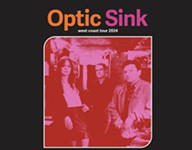From Scully to Spock
The Sights and Sounds of Worldcon
By Robert Faires, Fri., Sept. 19, 1997
The chance to sit in a group of 25 and watch Bruce Sterling ranting about everything from Louisiana politics to Allen Ginsberg cooking spaghetti for the Beats was an experience on which one cannot put a price.
The recent gathering in San Antonio, the official nom de con of which was LoneStarCon 2, was nothing if not proof that Worldcons offer a little something -- and frequently a helluva lot of something -- for everyone with a yen for things out of this world. Into the space of five days, convention programmers crammed some 600 events, ranging from panels on various aspects of the genre and industry to readings by authors to workshops for artists to video screenings of anime and some of Hollywood's recent SF efforts. The programs offered more than just a chance for industry insiders to push new product; in many cases, they provided attendees the opportunity to meet in small groups and listen to and palaver with favored pros and fans on such wide-ranging topics as the history of the Soviet space program, the future of Africa, UFOs, the government's role in space, Mystery Science Theatre 3000, ethics, feminism, baseball, food in SF, mythic images in art, and exploring Mars. A few sample titles of the panel discussions are proof that not only are SF writers and fans more socially conscious than their stereotype would indicate, they have a sense of humor, too: "Mad Scientists, Techno-Wizards, and Other Assorted Geeks," "Creating Wonderful Characters and Killing Them Ruthlessly," "An Agent Is to a Publisher as a Knife Is to a Throat," and, for a panel discussing such genre heroines as Xena, Buffy, La Femme Nikita, and Scully, "Venus Re-Armed and Dangerous."
Given that each daytime hour at the con offered at least 20 program options, it was impossible to be physically present for every event that piqued your interest. (If you had the cash, however, you could be virtually present for them all; every program was taped and made available to congoers for $11 a pop.) When considered from the standpoint that even the most diehard conventioneer could make only 5% of the scheduled events, LoneStarCon appears a frustrating proposition. But while I can testify to the agony of choosing between "Religion in SF" and "Live From Mars! The Little Robot That Could" (I finally opted for the former), when considered from the standpoint of programming quality, this LoneStarCon was an unqualified winner. Every panel I attended was its own globular cluster of information, densely packed with genre history, background on creators, advance info on future projects, and recommendations for outstanding works to look up. (From these, I eagerly acquired Mary Doria Russell's The Sparrow, the tale of a Jesuit mission to another planet, and Michael Bishop's Brittle Innings, a novel which casts Frankenstein's monster as a minor league baseball player, and I can't wait to find "13 Days to Glory," Scott Cupp's subversive reworking of the Alamo story in which the defenders of the mission are all gay.) The programs were almost equally dense with personality, with the participating fans and authors engaged in the topic at hand and discussing it frankly and in abundant good humor -- each event yielded at least a couple of memorable quotes, some of which have been reproduced here. The chance to sit in a group of 25 and watch local author Bruce Sterling hold forth for two hours, ranting almost nonstop about everything from Louisiana politics to Allen Ginsberg cooking spaghetti for the Beats, was an experience on which one cannot put a price.
The big order of business for the WorldCon is the presentation of the Hugo Awards, those fan-voted honors for achievement in the field in the preceding year, and while every awards ceremony today is to some degree a clone of the Oscars -- Master of Ceremonies with bagful of quips, distinguished presenters reading lists of nominees, winners rising from the crowd, heading to the stage, and thanking the members of the voting body and all those who made this possible -- the Hugos are distinctive for the way they're flavored with a little of that spice that marks serious SF fandom. I mean, how often at an awards ceremony do you hear nominees booed? (Sure, it was for a couple of glitzy Hollywood attempts at SF in the "Dramatic Presentation" category, but still....) The ceremony at LoneStarCon 2 also carried some of the fiery bite of chili powder, provided by Neal Barrett, Jr., an Austin writer of science fiction and mysteries who served as emcee. Though Barrett's good ol' boy laconic pacing wasn't always a plus -- there were pauses you could fly a space shuttle through -- his intelligence and wit and Lone Star personality made almost every utterance of his an occasion to laugh.
Still, while the Hugo ceremony is the raison d'être for WorldCon, in the end it isn't really what WorldCon is about. It relies too heavily on separation -- nominees and everyone else, the crowd and presenters, those on the inside and those not -- and looks too much like what everyone else who hands out awards does. WorldCon
is about coming together, in little rooms and big exhibit halls, in hallways and crowded elevators, in autograph sessions and readings and parties (lots and lots of parties -- serious parties). It's that expansive universe of interests and individuals, from the demure author in the Laura Ashley dress to the wild-eyed fan in the Viking helmet with the propellor on top, spiraling into one small corner of space and time, creating a galaxy in the guise of a convention.








